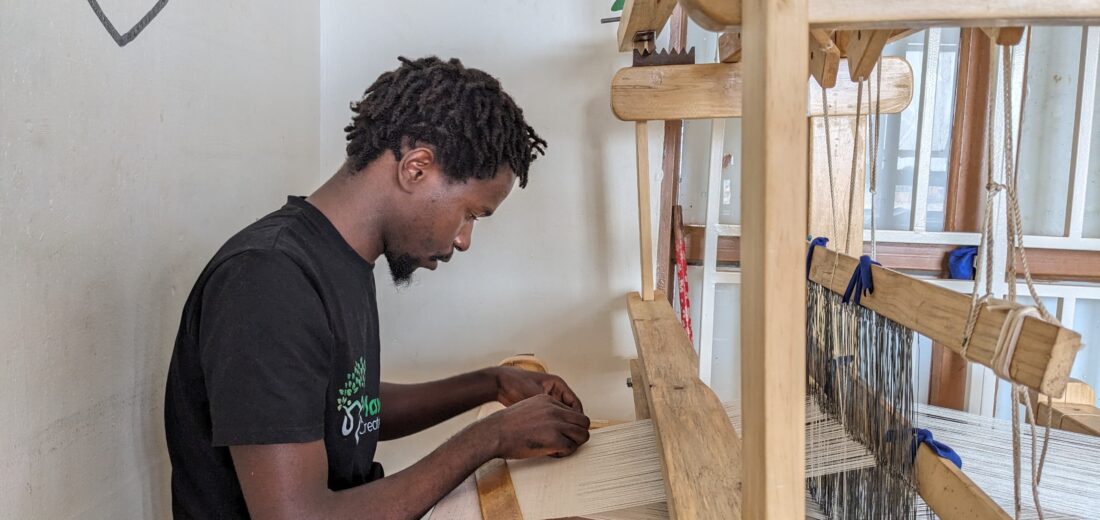
Mawejje Creations: Using Plant-Based Materials to Address Fast Fashion and Climate Change Issues.
Microplastics made of plastic are commonly found in mass-produced textiles in the fast fashion industry. However, using natural fibers like cotton, wool, and alpaca can improve both environmental and public health. Mawejje Creations, a social enterprise, is revolutionizing the fashion industry by using plant-based materials and textile waste to address issues related to fast fashion and climate change.

As a fashion lover, I am always mesmerized by the innovativeness of people and how fast the industry evolves. However, the proliferation of textile industries is associated with increased microplastic manufacturing and fast fashion overconsumption. Nearly everything we eat and drink, including beer, tap and bottled water, fish, poultry, and salt, has been linked to microplastics originating from textiles.
Considering these microfibers in our food chain, several questions regarding climatic stability and sustainability run through my mind. I spoke with Mawejje Mohammed Dimma, the Mawejje Creations team lead, over the weekend to gain more insight into his work.

Mawejje appeared deeply engrossed in the fabric he was creating behind the jack loom, a weaving apparatus, as he intently focused on it. Upon walking into his workspace, with a quick sweep, I beheld an assortment of the banana fiber products he had made, on the opposite side of the room before he broke the silence.
The Genesis

“Mawejje Creations began as an idea in 2014. Becoming a business owner was my dream in the past,” he smiles at the realization that every endeavor comes with challenges, responsibilities, and opportunities to learn new things.
Mawejje is a chef by profession. He started cooking during his Senior Four vacation in 2009. In 2010, he began working after getting a scholarship at Uganda Youth Development Link to study professional catering. But with time, he realized he was more than just a man behind the kitchen doing routine work for long hours and finally resigned in 2016.
As they say, dreams never die, Mawejje embarked on a journey of self-discovery and ventured into making handicrafts. He applied for a business incubation course under TexFad that focused on manufacturing products out of banana fiber. While there, he gets exposed to banana fiber and is eager to learn how the banana waste stems are sorted, extracted, and graded to obtain fiber.

“I left in 2018 after being awarded a scholarship to attend the German Academy, Social Innovation Academy, SINA, where I developed professionally and personally and understanding who I am,” he said.
Later that year, Mawejje incorporated Mawejje Creations, which was doing crafts. Initially, the concept was very simple, they started with handicrafts and equipping people with the same skill of designing wall clocks, earrings, and penholders. But he was perpetually curious about the possibilities of creating something unique—an eco-friendly fabric made from cheap, readily available banana fiber or agricultural biomass.

On an insightful evening in 2020 with Mr. Kamugyisha Frank, the Ecoplastile founder, Mawejje gets the absolute realization about his work, in Circular fashion.
Out of curiosity, he researched circular and sustainable fashion, the dangers, and benefits, and that is how his zeal to transform fiber into a fabric came in.
“We had no experience, but one day…” Mawejje narrates how he came across information and writings online on how the ancient Japanese and the Philippines made their clothing out of extracted fiber.
The fabric

“After several attempts and through imitation, I used that similar method to start developing a commune fabric”. Mawejje noted with satisfaction that he juxtaposed different fabrics from the first attempt he made in 2021 to the current prototype which is much finer.
Through his research, he discovered that different levels of extraction give varied results for fiber. To extract fine fiber from a banana pseudo-stem, he uses hands, knives, and needles to separate the back from the sheath, but it takes a lot of time and therefore requires patience.
Using a weaving jack loom, he interweaves the extracted fiber with cotton after it has sun-dried to create a fabric.

The first thought that crossed my mind was, “Is it washable?”
“One hundred percent,” he affirmed. Mawejje creates a fabric that, once disposed of, can decompose eventually.
“After a series of studies, I discovered that the material on the market contains, microplastic fibers, some of which wind up in oceans and landfills destroying the ecosystem and marine life. With the locally available materials, I wanted to make one that is environmentally friendly” he continued.
Mawejje has allowed himself to evolve and devised ways of getting fiber without interfering with the food cycle through consistent research. He currently works in communities and with a team of more than fifteen people, the majority of whom are mothers.

He believes that in ten years, Mawejje Creations will be among the largest businesses with the biggest research and development center, specializing in the conversion of various plant materials or fibers into textiles as they mitigate environmental issues, combat climate change, and advance food security.
In conclusion, I believe that problems with pollution, health, climate change, ecology, and marine life may be lessened if the textile companies adopt the path of employing alternatives like natural or plant fiber with a focus on sustainability, like Mawejje Creations.
-
WORLD PRESS FREEDOM: A PRESS FOR THE PLANET – Vice Versa Global
03.05.2024[…] Mawejje Creations: Using Plant-Based Materials to Address Fast Fashion and Climate Change Issues. […]

Leave a Reply